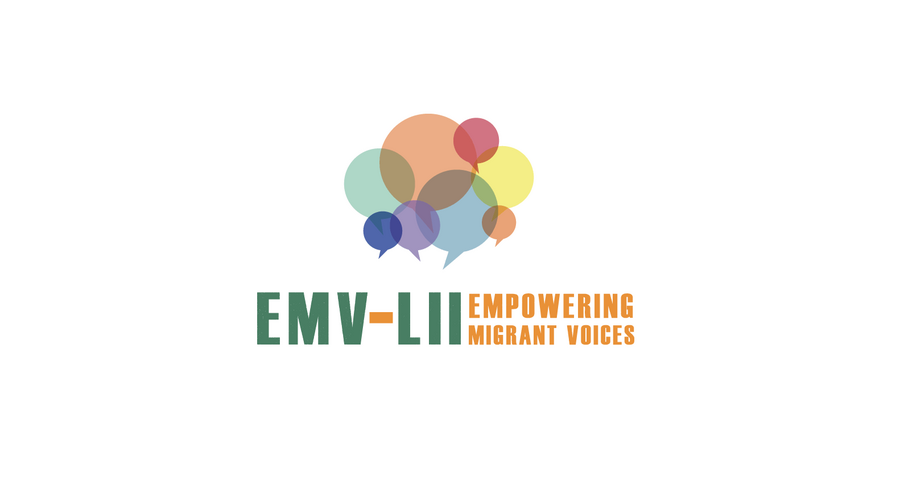EMV-LII - Strengthening migrant voices in local integration and inclusion processes
The EMV-LII project is based on the overarching principle that it is the participation of migrants that is crucial for the success of local integration and local integration strategies. The project is therefore relevant for European integration processes.
Integration takes place in every village, town, and region where migrants live, work, go to school, and are members of clubs and associations. Although integration policies are often determinated by the national government, the local level plays a crucial role. The second theme of the AMIF call outlines what we have already recognised and advocated in the previous EMVI project: that integration at the local level is crucial for both migrants and local communities. The EMV-LII project is based on the overarching principle that it is the participation of migrants that is crucial for the success of local integration and local integration strategies. The EMV-LII project is therefore relevant for European integration processes. At the same time, it builds on the previous AMIF Strengthening Migrant Voices in Integration Policies - EMVI (2022-2023) project by deepening and strengthening the processes piloted and by extending the activities to two more countries (Croatia, and Luxembourg) and new local and regional authorities. EMV-LII proposes new innovative tools and activities to increase the participation of migrants in local integration processes. It is characterised by a unique and diverse multi-stakeholder partnership involving 19 NGOs, local and regional authorities, migrant-led organisations and councils. The stakeholders come from 7 countries (Austria, Croatia, Greece, Germany, Italy, Luxembourg, Slovenia), including one EU partner from Brussels.
As stated in the second theme of the AMIF call for proposals, the overarching principle of the project is: "Local strategies and activities that ensure adequate coordination and consultation are key to the early initiation and success of the integration process. The development and implementation of these strategies should involve all actors in the promotion of integration, including migrant communities, who should be consulted where appropriate in the design of integration measures and policies." EMV-LII project develops, improves, strengthens and expands various methods of migrants' participation in the design and implementation of local integration and integration strategies, such as Migrants' Councils, online and face-to-face participation in the processes of asking questions and proposing ideas, the e-participation portal and round tables on migrant-led advocacy and policies.
The main highlights of the EMV-LII project are:
- Inclusive societies for all;
- Local and regional levels are key for integration and inclusion;
- Migrants play a key role in integration and inclusion processes;
- Integration and inclusion are two-way processes, so capacity and exchange with the state and its institutions are essential;
- Migrants' participation is crucial for local and regional integration and beyond;
- Migrants' integration is much more effective if their participation is increased;
- Digitisation must involve migrants.
Overall project objective: To support the emergence, development and implementation of local integration strategies by increasing the participation of migrant organisations for more effective integration at local and regional level. A particular focus is on the integration of vulnerable migrant groups such as applicants for international protection, young migrants, children and women.
Specific objective 1: Strengthen and empower migrants' participation in local integration and integration through training and capacity building.
Specific objective 2: Increase the capacity and willingness of local and regional authorities to involve migrants in local integration and integration strategies.
Specific objective 3: Strengthen cooperation mechanisms for local integration and inclusion.

This project was funded by the European Union’s Asylum, Migration and Integration Fund. The content of it represents the views of the EMVI Project Partnership only and is its sole responsibility. The European Commission does not accept any responsibility for use that may be made of the information it contains.
Project background
Project duration: 1.3.2024 - 31.3.2027
Estimated project value (all partners): EUR 1,729,277.29
EU co-financing (MOL): EUR 25,872.00
EU co-financing (all partners): EUR 1,556,339.42
EU co-financing rate: 90 %
Project partners
Lead Partner: Sudwind verein fur entwicklungspolitik und globale gerechtigkeit (Sudwind), Austria
Partners:
- Municipality of Ljubljana, Slovenia
- COSPE, Cooperazione per lo Sviluppo dei Paesi Emergenti, Italy
- moveGLOBAL e.V., Germany
- Senatsverwaltung für Arbeit, Soziales, Gleichstellung, Integration, Vielfalt und Antidiskriminierung - Beauftragte des Senats von Berlin für Integration und Migration, Berlin
- Comune di Empoli, Italy
- MigrantInnenbeirat Graz, Austria
- City of Graz, Austria
- Marktgemeinde Lustenau, Austria
- African Diaspora Youth Forum in Europe (ADYFE), Austria
- Cultural Association Gmajna, Slovenia
- Peace Institute, Slovenia
- Community of Municipalities of Slovenia, Slovenia
- Udruge centar za mirovne studije (CMS), Croatia
- Međimurje County, Croatia
- SYMBIOSIS, Greece
- ANAPTYXIAKI IRAKLEIOU ANAPTYXIAKIANONYMOS ETAIR, Greece
- Formation et Sensibilisation de Luxembourg, Luxembourg
- Administration Communale de Schifflange, Luxembourg
Contact
Department of Health and Social Welfare
Cigaletova ulica 5
1000 Ljubljana
T: +386 1 306 41 00
E: simona.topolinjak@ljubljana.si and darija.boznik@ljubljana.si
Department for Culture
Ambrožev trg 7
1000 Ljubljana
T: +386 1 306 48 45
E: vanda.straka@ljubljana.si
European Project Office
Adamič-Lundrovo nabrežje 2
1000 Ljubljana
T: +386 1 306 12 60
E: euprojekti@ljubljana.si and bernarda.kristof@ljubljana.si


